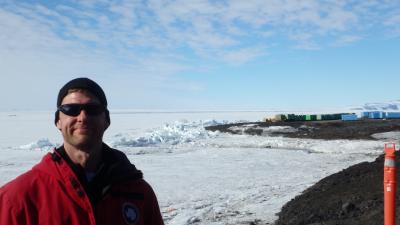Update
Teacher Ric Thuma and Dr. Madsen will be hosting several PolarConnect events over the duration of their stay in McMurdo, Antarctica. For more information and to register, fill out this form.
What Are They Doing?
 The circuit board of the cosmic ray detector. Photo by Juan Botella.
The circuit board of the cosmic ray detector. Photo by Juan Botella.
Neutron monitors are used to study cosmic rays, and indirectly the sun, which occasionally undergoes solar storms that produce bursts of energetic particles. We are interested in learning more about the energy range and abundance of the particles produced in these events, which is important for understanding how to protect electronics and the electrical grid from extreme space weather events. The McMurdo deployment will involve dismantling two neutron monitors and if possible, the South Pole deployment will be to perform routine maintenance.
Where Are They?
 McMurdo Station, Antarctica. Photo by Tim Spuck.
McMurdo Station, Antarctica. Photo by Tim Spuck.
We will be staying at McMurdo station, and working at the CosRay building, which is a short hike from the station, just beyond Observation Hill. The neutron monitor project is the longest continuously running experiment in Antarctica. The neutron monitors will be reassembled and continue operating at the Korean Antarctic base Jang Bogo. One neutron monitor station formally at CosRay was redeployed at Jang Bogo in December 2015 so this project will maintain a continuous data record in Antarctica starting in 1961.
Latest Journals

Dr. Madsen is the chair of the Physics Department at UW-River Falls and Associate Director of the IceCube Neutrino Observatory where he directs the education and outreach program. His research interests include heliophysics and astrophysics, which he has studied at his various projects in Antarctica. In addition to research, Dr. Madsen is committed to reaching a broad audience beyond the research community. He is involved in education and outreach for the IceCube project including professional development courses for teachers and science and math instruction for the UWRF Upward Bound Program. He collaborates with a number of programs and institutions in addition to PolarTREC, including the Knowles Science Teaching Foundation, UW-River Falls Upward Bound and McNair Programs, and service groups (Rotary International, Boy and Girl Scouts, university alumni associations, etc.). You can read more about Dr. Madsen's work here and here.
"Working in Antarctica is a wonderful adventure, and it is great to provide opportunities for others to have this awesome experience."

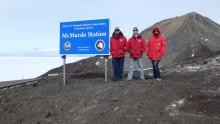
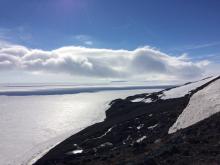
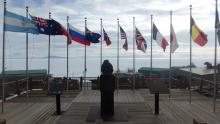
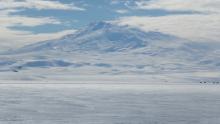

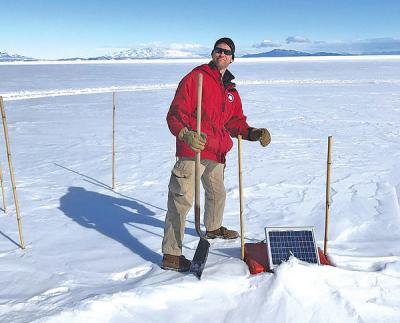 Eric Thuma stands on the McMurdo Ice Sheet, preparing to extract a seismometer. (Photo provided by Dr. Doug MacAyeal)
Eric Thuma stands on the McMurdo Ice Sheet, preparing to extract a seismometer. (Photo provided by Dr. Doug MacAyeal)